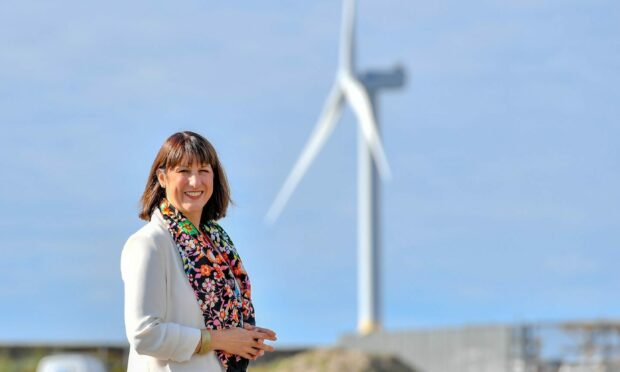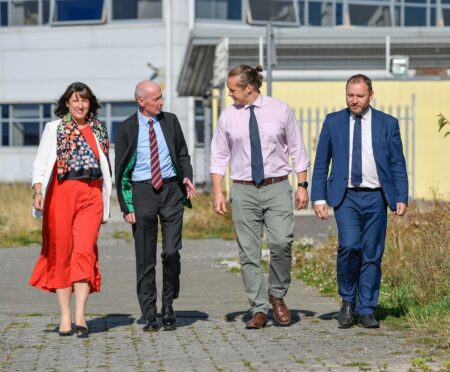Shadow chancellor Rachel Reeves has warned against Liz Truss’s push for more North Sea oil and gas to ward off the immediate impact of an energy crisis.
Ms Reeves, who was visiting a Scottish renewable energy base on Wednesday, stressed she sees a longer term role for oil and gas.
But the MP said wind and hydrogen are better bets for extra investment.
She also risked stoking a backlash from the SNP by saying nuclear power should be a “really important part” of the UK’s future energy mix.
She was reacting after reports Ms Truss – the frontrunner to be the next prime minister – is considering issuing up to 130 new drilling licences if she gets into Downing Street.
‘A role for North sea oil and gas’
During a visit to Fife Renewable Innovation Centre, Ms Reeves said: “Obviously there is a role for North Sea oil and gas in our transition towards net zero.
“It is still really important in contributing to our energy needs as a country.
“But the truth is the cheapest form of energy comes from wind and hydrogen.
“That is the fastest and cheapest way to boost energy security and resilience and create good jobs in Scotland that pay good wages.”
Asked to comment on Ms Truss’s desire to issue more oil and gas licences, Ms Reeves said: “I don’t think Liz Truss has the right approach.
“That is not going to deliver new oil and gas any time soon and will not reduce prices because it would still be sold on an international market.
“There are cheaper alternatives with quicker lead times to reduce gas and electricity bills.”
The SNP have also voiced their opposition to Ms Truss’s desire for more drilling in the North Sea, saying it will not solve the energy price crisis.
A spokesman for the Scottish Government said: “Wind power is already one of the cheapest forms of electricity and our expansion plans for both on and offshore wind provides a fantastic opportunity to support an energy transition which not only delivers on our climate obligations, but which ensures a fair and just transition for the oil and gas sector and wider industry.”
Pledge to support Highlands and islands
Ms Reeves said Labour wants to invest more in making energy bills cheaper for people in the Highlands and islands, costs are about to get much higher.
She hopes a general election will be held shortly after the new prime minister is announced on September 5 to give Labour a chance of overturning the Conservatives’ 80-seat majority in the House of Commons.
It’s been warned that annual energy costs for households in Shetland could rise to more than £10,000 a year by April 2023.
The cost of living is already up to 65% higher than the rest of the UK in the Northern Isles.
Ms Reeves said: “Too often policymakers forget about people living in rural areas who have to pay more for their heating.
“We have a package of £2.6 billion for Scotland to take £1,000 off people’s bills and I would extend that to people who are off-grid in those rural areas.
“That was really important to me when I designed that package.”
Long term plan needed for North Sea oil
Ross Dornan, from industry body Offshore Energies UK, said the UK will never produce more oil and gas than it needs.
“We’re not calling for unlimited extraction, but rather the long term, sensible and responsible management of production in line with how demand will evolve,” he said.
“This will help us to manage our energy supplies effectively as we transition over time to a lower carbon energy system.”

